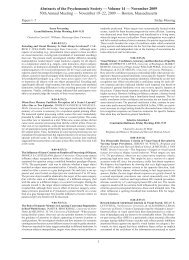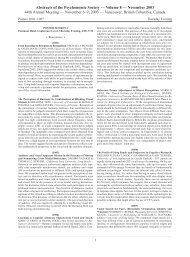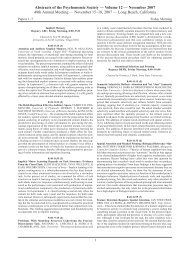Abstracts 2005 - The Psychonomic Society
Abstracts 2005 - The Psychonomic Society
Abstracts 2005 - The Psychonomic Society
You also want an ePaper? Increase the reach of your titles
YUMPU automatically turns print PDFs into web optimized ePapers that Google loves.
Posters 1113–1119 Thursday Evening<br />
A number of studies examining predictive inferences have found evidence<br />
that they can be activated immediately after a biasing story<br />
context. More recent research has also shown that in some situations,<br />
predictive inferences can be encoded into memory. Although the nature<br />
of the memory representation for predictive inferences is somewhat<br />
unclear (i.e., specific inferences vs. general state changes), it is<br />
clear that predictive inferences can be stored in memory. <strong>The</strong> present<br />
study expanded upon earlier research and examined how inference<br />
specificity affects the encoding of predictive inferences. Participants<br />
read stories that have previously been shown to result in the encoding<br />
of predictive inferences in one of three versions: one that was altered<br />
to make the inference less compelling, one that mentioned a general<br />
“state change” outcome, or one that explicitly mentioned the inference<br />
outcome. Following a backgrounding second paragraph, a target line<br />
explicitly mentioned the inference outcome, and reading times were<br />
measured. Results are compared with previous findings and implications<br />
for theories of discourse processing are considered.<br />
(1113)<br />
Predictive Inferences: <strong>The</strong> Interacting Influence of Context and<br />
General World Knowledge. SABINE GUERAUD, University of New<br />
Hampshire, ISABELLE TAPIERO, University of Lyon 2, & EDWARD J.<br />
O’BRIEN, University of New Hampshire—Previous research has<br />
demonstrated that the activation of predictive inferences can be affected<br />
both by the immediately preceding context and information<br />
contained in an earlier portion of the discourse model. Experiments 1<br />
and 2 demonstrated that the same immediate context can result in the<br />
activation of very different inferences when different character trait<br />
descriptions of the protagonist are presented in an early portion of the<br />
passage. Experiment 3 demonstrated that the trait descriptions were<br />
sufficient to produce activation of only one specific inference; this occurred<br />
even though the immediately preceding context in isolation lead<br />
to the activation of a very different inference. Results of all three experiments<br />
are discussed within the memory-based view of text processing.<br />
(1114)<br />
Resolving Inconsistencies During Reading. ANNE E. COOK, University<br />
of Utah, & SABINE GUERAUD & EDWARD J. O’BRIEN,<br />
University of New Hampshire—Previous research has shown a slowdown<br />
in reading times on a target sentence (e.g., Mary ordered a<br />
cheeseburger and fries) when that sentence was inconsistent with earlier<br />
information (e.g., Mary was a vegetarian). <strong>The</strong> present study investigated<br />
how readers resolved that inconsistency. A second target<br />
sentence was added later in the text that was also inconsistent (e.g.,<br />
Mary decided she wanted to eat a steak). In Experiment 1, reading<br />
times did not slow down on this second target sentence, but did slow<br />
down on the spillover sentence. In Experiment 2, the degree of inconsistency<br />
was explicitly reduced (e.g., with the information that<br />
Mary used to be a vegetarian). <strong>The</strong> slowdown in reading times became<br />
evident on the target sentence. Thus, the slowdown in reading<br />
for the second-target-sentence conditions was greater and more immediate<br />
when the text provided a resolution for the first target sentence<br />
than when the reader needed to generate one.<br />
(1115)<br />
Visual Perspective Taking in Narratives. ANGELA S. RALANO &<br />
CELIA M. KLIN, SUNY, Binghamton—Horton and Rapp (2003) found<br />
that readers sometimes encode information from the visual perspective<br />
of story protagonists. <strong>The</strong> goal of the present research was to<br />
replicate and extend these findings. In Experiment 1, we found that<br />
after reading a narrative, participants responded more slowly to a<br />
question about a target object if that object had been visually occluded<br />
from the protagonist’s view (e.g., surfers occluded by fog). In Experiment<br />
2, we used a recognition probe task and found that participants<br />
responded more slowly in the occluded version than in a nonoccluded<br />
version to a probe word representing the target object (e.g., surfers).<br />
In Experiment 3, we measured reading time on a line that reintroduced<br />
the targeted object. As in Experiments 1 and 2, reading times were<br />
68<br />
slower in the occluded version. We conclude that occluded objects are<br />
less accessible in readers’ memory representations.<br />
(1116)<br />
Interactions Between Reader Characteristics and Text Properties in<br />
Comprehension of Scientific Principles. PANAYIOTA KENDEOU<br />
& PAUL VAN DEN BROEK, University of Minnesota—We investigated<br />
the effects of accuracy of prior knowledge and text structure on comprehension<br />
of scientific texts. Think-aloud and reading-time results<br />
indicated that differences in prior knowledge affected online inferential<br />
processing, but only in terms of content and not in terms of the<br />
processes per se. In addition, readers with inaccurate knowledge engaged<br />
in conceptual change processes, but only when the text structure<br />
foregrounded misconceptions (refutation structure). <strong>The</strong>se online<br />
effects were independent of readers’ working memory capacity and<br />
need for cognition, although each of these factors influenced specific<br />
reading situations (e.g., when the text was difficult). <strong>The</strong> results of a<br />
recall task indicated that differences in prior knowledge, but not in<br />
text structure, influenced readers’ memory for the texts. <strong>The</strong>se offline<br />
effects were also independent of readers’ working memory capacity<br />
and need for cognition.<br />
(1117)<br />
Inferences and Cognitive Resources: A Knowledge Domain Issue?<br />
CONNIE SHEARS, Chapman University—Cognitive resources are<br />
required to form knowledge-based inferences. Comprehension relies<br />
on our ability to form inferences from many knowledge domains.<br />
Thus, specifying the resource differences between domains of knowledge<br />
is important for understanding when comprehension processes<br />
may be slowed or unsuccessful. Claims that cognitive resources are<br />
differentially relied upon for types of inferences (predictive vs. explanatory)<br />
have been examined, yet resource requirements may differ<br />
at a more fundamental level. <strong>The</strong> knowledge drawn upon to form inferences<br />
may itself depend on varying amounts of cognitive resources<br />
to support the formation of causal inferences. I hypothesized that brief<br />
narrative texts based on physical versus planning knowledge would<br />
elicit differences in comprehension if these two knowledge domains<br />
require varying amounts of cognitive resources. Results indicated that<br />
answers to comprehension questions were faster and more accurate for<br />
texts based on physical knowledge rather than planning knowledge.<br />
However, probe measures of inference processing were not different<br />
between knowledge domains. <strong>The</strong>se findings suggest that cognitive<br />
resource differences may be specific to knowledge domains rather<br />
than to the inference process itself.<br />
(1118)<br />
<strong>The</strong> Role of Attention in Perspective Taking. SHUHONG LIN &<br />
BOAZ KEYSAR, University of Chicago—Dual-process theories of cognitive<br />
processing state that two systems—automatic versus controlled—<br />
interact and affect behavior. We propose that perspective taking in<br />
conversation uses a similar dual process. Failure to take another’s perspective<br />
happens when one relies on automatic, readily accessible processing;<br />
taking another’s perspective requires more effortful, controlled<br />
processing. We tested this hypothesis through two experiments that manipulated<br />
the attentional capacity of the participants while they played<br />
a referential communication game. In Experiment 1, participants performed<br />
a concurrent secondary task, inducing either a high or low cognitive<br />
load. In Experiment 2, participants with either high or low working<br />
memory span played the same communication game. We found that<br />
participants’ comprehension is more egocentric when under a high-load<br />
manipulation than under low load, and participants with lower working<br />
memory span behave more egocentrically than those with high span.<br />
This demonstrates that perspective taking is an effortful process.<br />
(1119)<br />
Does Mental Imagery Improve Text Comprehension? LAURA<br />
MOTYKA & DAVID W. ALLBRITTON, DePaul University—An experiment<br />
investigated the effectiveness of mental imagery instructions





